Related Research Articles

Vicente Pío Marcelino Cirilo Aleixandre y Merlo was a Spanish poet who was born in Seville. Aleixandre received the Nobel Prize for Literature in 1977 "for a creative poetic writing which illuminates man's condition in the cosmos and in present-day society, at the same time representing the great renewal of the traditions of Spanish poetry between the wars". He was part of the Generation of '27.
The Generation of '27 was an influential group of poets that arose in Spanish literary circles between 1923 and 1927, essentially out of a shared desire to experience and work with avant-garde forms of art and poetry. Their first formal meeting took place in Seville in 1927 to mark the 300th anniversary of the death of the baroque poet Luis de Góngora. Writers and intellectuals paid homage at the Ateneo de Sevilla, which retrospectively became the foundational act of the movement.
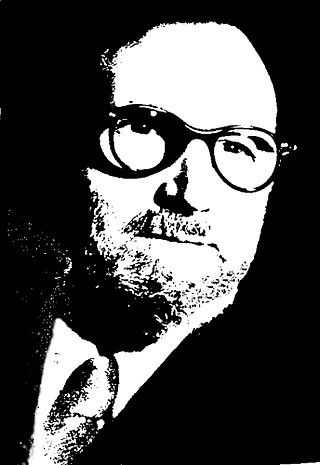
León Felipe Camino Galicia was an anti-fascist Spanish poet.

Pedro Salinas y Serrano was a Spanish poet, a member of the Generation of '27, as well as a university teacher, scholar and literary critic. In 1937, he delivered the Turnbull lectures at Johns Hopkins University. These were later published under the title Reality and the Poet in Spanish Poetry.
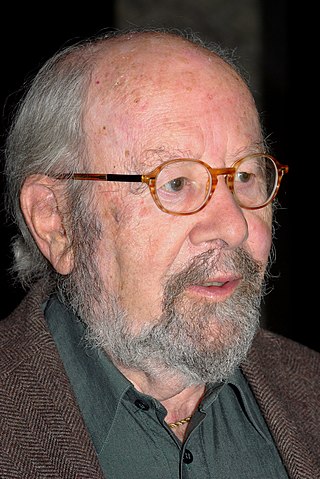
José Manuel Caballero Bonald was a Spanish novelist, lecturer and poet.
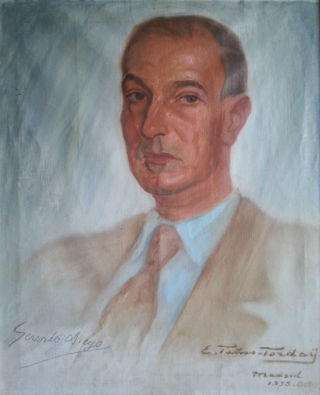
Gerardo Diego Cendoya was a Spanish poet, a member of the Generation of '27.
Clara Janés Nadal, born in Barcelona, is a Spanish writer of several literary genres. She is recognised as a poet and is distinguished as a translator of different central European and eastern languages. Since 2015, she has occupied a seat in the Real Academia Española [1], becoming the tenth woman elected as a member of the RAE.

Diego Valverde Villena, born on April 6, 1967, is a poet, essayist and polyglot who holds triple-citizenship. He is Peruvian by birth to Spanish and Bolivian parents.
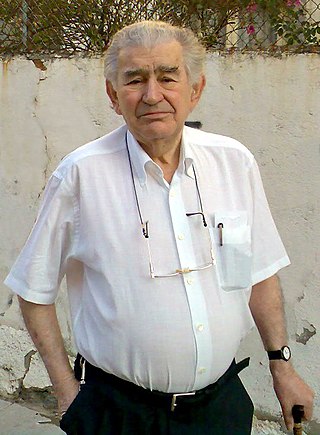
Antonio Gamoneda Lobón is a Spanish poet, winner of the Cervantes Prize in 2006.
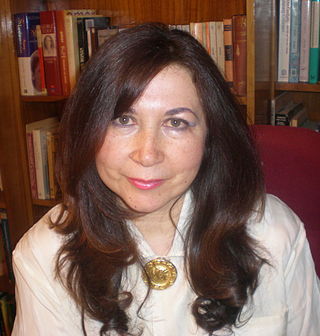
Beatriz Villacañas is a poet, essayist and literary critic.

Juan Antonio Villacañas was a Spanish poet, essayist and critic. In 2015, he was named distinguished son of the city of Toledo.
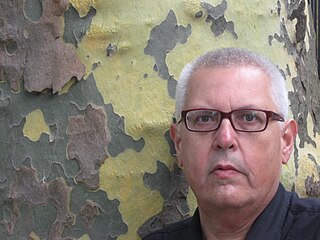
Víctor Rodríguez Núñez is a Cuban poet, journalist, literary critic and translator.

Luis Alberto Ambroggio is an Argentine American poet, independent scholar and writer. Full Member of the North American Academy of the Spanish Language and correspondent of the Spanish Royal Academy. His works include essays, poetry and translations.

Luis García Montero is a Spanish poet, literary critic and academic. He is a professor of Spanish Literature at the University of Granada.
Antonio Colinas Lobato is a Spanish writer and intellectual who was born in La Bañeza, León, Spain on January 30, 1946. He has published a variety of works, but is considered to be above all a poet. He won Spain's National Prize for Literature in 1982, among several other honors and awards.
Aurora Luque Ortiz is a Spanish poet, translator, teacher, and writer based in Andalusia.

Pilar Paz Pasamar was a Spanish poet and writer whose work has been translated into Italian, Arabic, French, English and Chinese. She was a member of the Cádiz branch of the 1950s poetic generation. She was a member of the Real Academia Hispano Americana de Cádiz since 1963. Her awards and honors include second place from the Premio Adonáis de Poesía for "Los buenos días" (1954), Adoptive Daughter of the city of Cádiz (2005), Meridiana Prize of the Andalusian Institute of Women (2005), included in the section "Own Names" of the Instituto Cervantes, and Author of the Year by the Andalusian Center of Letters of the Junta de Andalucía (2015). The city council of her hometown annually awards the Pilar Paz Pasamar Prize for short stories and poetry by women.

Guillermo Diaz-Plaja Contestí was a Spanish literary critic, historian, essayist, and poet.
Manuel Álvarez Ortega was a Spanish poet, translator, writer, and veterinarian. He was the director and founder of the journal Aglae, which circulated between 1949 and 1954. He wrote many of his works in Madrid, the city where he lived starting in 1951.

Francisco Rodríguez Marín was a Spanish poet, paremiologist, and lexicologist.
References
- Cano, José Luis: “La poesía de Manuel Mantero”, in Poesía española contemporánea. Las generaciones de posguerra, Madrid, 1974.
- Hernández, Antonio: “Manuel Mantero”, in Una promoción desheredada: la poética del 50, Madrid, 1978.
- Debicki, Andrew P.: “Ángel Crespo y Manuel Mantero”, in La generación española de 1956, Madrid, 1987.
- V.V.A.A.: “Manuel Mantero. Una poética indagatoria de la otredad”, in Anthropos, n. 116, dedicated to Manuel Mantero, 1991.
- Mantero, José María: “Los símbolos de creación y destrucción en Antes muerto que mudado de Manuel Mantero”, in Salina, n. 8, December 1994.
- Barnette, Douglas W.: A Study of the Works of Manuel Mantero, Lewiston, N. York; Queenston, Ontario; Lampeter, United Kingdom, 1995.
- Gómez Bedate, Pilar: “Manuel Mantero, del Yo al Nosotros”, in Poetas españoles del siglo XX, Madrid, 1999.
- V.V.A.A.: Manuel Mantero, in República de las Letras, n. 7, dedicated to Manuel Mantero, July 2001.
- V.V.A.A.: Manuel Mantero: lectura de la llama en el verso, vol. dedicated to Manuel Mantero. Eds. Julia Uceda and Sara Pujol. Ferrol, 2002.
- Ross, John A.: “Madre del tiempo”, in Tierra de Nadie, n. 6, September 2005.
- Peñas-Bermejo, Francisco J.: “La pluralidad del Yo en la poesía de Manuel Mantero”. Introduction to vol. I de Obras completas. Poesía: Como llama en el diamante de Manuel Mantero, Sevilla, 2007.
- Crespo, Ángel: “La espiral lírica de Manuel Mantero”, in Las cenizas de la flor, Madrid, 2008.
- Soto Vázquez, José, y Ramón Pérez Parejo: “La singularidad del poeta Manuel Mantero: Guía didáctica a través de los textos”, in Fuentes, n. 10, 2010.
RECORDINGS ON CD AND CASSETTES
- “Manuel Mantero”: Encuentro de Luis Cernuda con Verlaine y el demonio, in the poet’s own voice, in Doce poetas en sus versos, Aguilar, GPE 10 114 (with Rafael Alberti, Jorge Guillén, Carmen Conde, Ángel González and others).
- “Manuel Mantero: Evangelio del día”, in Poesía última, Fidias, F-048-33. (With Manuel Alcántara, Claudio Rodríguez, José Ángel Valente, Carlos Sahagún and others).
- “Manuel Mantero: Evangelio del día”, in Poesía última, S.G.A.E. MF-36. Cassette.
AUDIO/VISUAL LINKS
- “Manuel Mantero”, www.acec.cat Poets’ File. Vídeo. Commentated poetry reading by the poet, with an interview. (Also on DVD-R 4 x).
- “Manuel Mantero”, www.bibliotecavirtualdeandalucia.es/opencms/vivavoz/html Vídeo. Commentated poetry reading by the poet, with an interview.
- Burgos, Antonio: “El RedCuadro. Personajes, Manuel Mantero”, www.antonioburgos.com
- Gómez-Martínez, José Luis: “Manuel Mantero. On High”, www.ensayistas.org/textos/poesía/alto.htm
- Acuyo, Francisco: “Manuel Mantero from the Infinite Hemishere”, www.franciscoacuyo.com/2011/02/manuel-mantero-desde-el-hemisferio.html
- Acereda, Alberto: “Baggage by Manuel Mantero”, www.libertaddigital.com/libros
(17 December 2005).
Please go to : manuelmantero.org